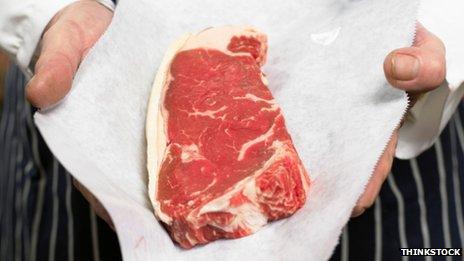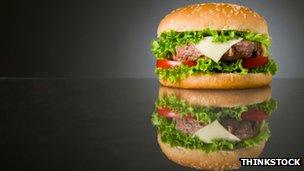Red meat: What is a 13% increase in the risk of death?
- Published
- comments

Eating an extra portion of red meat every day will increase your risk of death by 13% annually, according to a new study. It sounds scary - but is it?
Harvard Medical School researchers have concludedthat a diet high in red meat can shorten life expectancy, external.
They studied the diets and health of more than 120,000 people over the course of more than 20 years and found that red meat is associated with an increased risk of fatal heart disease and terminal cancer.
Over the study period, an extra portion of unprocessed red meat was associated with an overall 13% increased risk of death annually (and the figure for processed meat was even higher).
But what does this mean?
The easiest way to understand it is to think of how this might affect two friends who live very similar lives, according to David Spiegelhalter, a Cambridge University biostatistician, and the Winton Professor of the Public Understanding of Risk.
Imagine that the two friends are men aged 40, who are the same weight, do the same amount of exercise and do the same job.
The only difference between them is that one eats an extra portion of red meat every day - an extra 85g, or 3oz.
"Let's say that every work lunchtime one of them had a hamburger and the other didn't.
"What the study found is that the one who likes the meat had a 13% extra risk of dying. They're both going to die in the end, but one has got this extra annual risk of dying."
But what does that extra risk amount to in practice - for these two average people? The paper doesn't say.
Spiegelhalter has been working it out.
"The person who eats more meat is expected to live one year less than the person who doesn't eat so much meat. You'd expect the 40-year-old who does eat the extra meat to live, on average, another 39 years, up to age 79, and the person who doesn't eat so much meat, you'd expect him to live until age 80."
So all those headlines, and it turns out we are talking about whether you might live to age 79 or 80.
Maybe you feel willing to sacrifice that year in order to enjoy a life full of roast beef and steak sandwiches.
But Spiegelhalter says there is another way to look at the statistics, which might make the issue seem more urgent. That one year off the life of this 40-year-old hypothetical burger eater is equivalent to losing half an hour a day.
"On average, when he's sitting eating his extra burger, that person is losing half an hour of life because of that meal. On average, it's equivalent - scaled up over a lifetime - to smoking two cigarettes a day, which is about half an hour off your life.
"Or, it's equivalent to being a bit overweight - about 5kg overweight - which I am, so I'm losing, on average, every day, half an hour off my life expectancy."
Which is why Spiegelhalter had just been out for a run when he spoke to the BBC. (And perhaps why he became the first OBE to take part in BBC Television'sWinter Wipeoutassault course challenge.)

Tasty, but too many of these could shorten your life
So, that's the numbers explained. But should we really believe the findings of this study? Does eating red meat and processed meat cause cancer and cardiovascular disease and shorten life?
Well, no we can't say there's cause and effect here. All that can be said is that there appears to be a strong correlation between eating this kind of meat and having these health problems.
So another question springs to mind - could eating red meat just be perfectly healthy in itself, but correlated with some hidden health risk?
The researchers at Harvard couldn't run a randomised controlled trial where half the participants ate burgers for two decades and the other half didn't, but they could use statistical techniques as the next best thing.
They statistically controlled for a wide number of other potential risk factors, such as alcohol consumption, calorie intake, activity levels, and family history of cancer.
The link between red meat and cancer may still be a coincidence - as there may be other factors the researchers haven't controlled for - but they have certainly tried to rule out confounding factors.
In addition, Spiegelhalter points to the fact these findings chime with those of other studies.
Personally, he is going to eat more fish in the future and think of red meat as a treat. But, in the same breath, he confessed to be harbouring some tasty looking sausages in his freezer.
- Published14 March 2012